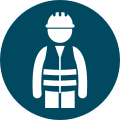
Our vision:
A safe and healthy Kitsap County for all.
Extreme Heat
Getting too hot without a way to cool off can make you very sick.
Older adults, young children, people with health conditions, people who work or exercise outdoors, and people who do not have access to air conditioning are at higher risk for heat-related illnesses.
Learn more about signs and symptoms of heat-related illnesses so you can take care of yourself and check on loved ones, friends, and neighbors when temperatures heat up.

Click here to view current air quality if graphic does not load.
Checking Air Quality
For current air quality conditions in Kitsap County, go to:
For updates on wildfire activity and smoke forecasts, visit the Washington Smoke Information blog
Health Hazards
For information on how to stay safe and healthy during some of the most likely hazards we see or will likely experience in Kitsap County, check out the links below.
Visit the Kitsap County Department of Emergency Management website to learn more about local disaster preparedness and sign up for alerts. More resources are available at Ready.gov.
Heat and your health
Heat-related illnesses, like heat exhaustion or heat stroke, can happen to anyone and are most likely to affect:
Babies and children
People who are pregnant
Older adults (65 and older)
People who work or exercise outdoors
People with chronic health conditions
Households that do not have air conditioning
Heat exhaustion & heat stroke
Signs of heat exhaustion can include:
Heavy sweating
Cold, clammy skin
Fast, weak pulse
Nausea or vomiting
Muscle cramps
Tiredness/weakness
Dizziness
Headache
Loss of consciousness (passing out)
If you believe someone has heat exhaustion, you can help them by:
Moving them to a cool place.
Giving them water to drink.
Loosening their clothes.
Putting cool, wet cloths on them.
Encouraging them take a cold bath or shower (if possible).
Signs of heat stroke can include:
High body temperature (103° or higher)
Hot, red skin
Fast, strong pulse
Headache
Dizziness or nausea
Confusion
Loss of consciousness (passing out)
Call 911 if you think someone has heat stroke. Heat stroke is a medical emergency.
While waiting for help, work on lowering their body temperature with the methods listed for heat exhaustion but do not give them water to drink.
Stay cool on hot days
Stay in cool, indoor spaces as much as you can. If you are not able to stay cool in your home, go to a public space with air conditioning.
Drink plenty of water. Limit caffeine, alcohol, and sugary drinks.
Wear loose, lightweight, light-colored clothing. Cool yourself with wet clothing. Use sunscreen.
Pace yourself when working or exercising outside. Try to plan activities in the mornings. Take breaks.
Take cool showers or baths, or visit a pool, lake or swimming beach. For current beach advisories, go to kitsappublichealth.org/beaches or call 360-728-2235.
Check on neighbors and loved ones. Visit or call at least twice a day and encourage them to follow these tips.
Be prepared
Watch the weather forecast. Check your favorite local news source or weather.gov.
Learn about cooling centers. Cooling centers may be open when the weather is extremely hot. Visit kitsapdem.com or call 211 for more information.
Hot weather & your utilities
State law protects your access to water and electricity during heat waves. Whenever the National Weather service issues a heat warning for the area where you live, your utilities cannot be disconnected due to nonpayment.
If your service has already been disconnected for nonpayment, you can request reconnection for the duration of the heat wave.
If your utility service has been disconnected:
Check to see if there is a National Weather Service Alert in your area by visiting NWS Alerts and entering your zip code, or by calling (206) 526-6087.
If there is an active alert, contact your utility provider or landlord and request reconnection.
More resources
Data: Air Quality & Asthma Visits to Kitsap Emergency Departments

Data: Heat Extremes in Kitsap County

Data: Precipitation in Kitsap County

Data: Temperature & Heat-related Visits to Emergency Departments

Data: Temperature and Cold-related Visits to Kitsap Emergency Departments










.png)
